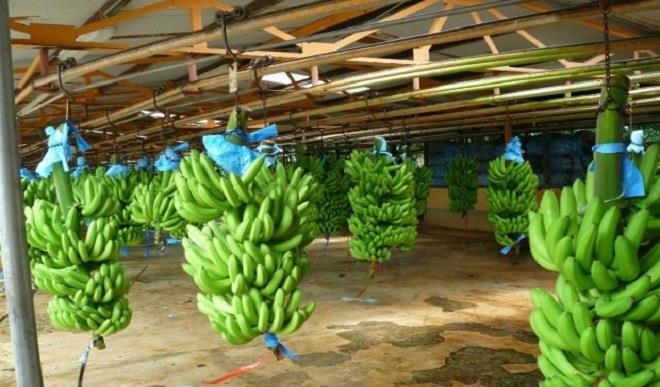Rivers abandons multi-million naira banana farm
For hundreds of indigenes of Zor-sogho, Luusue-sogho, Barakaani-sogho, Akporo-sogho, Teka-sogho, Okwale, Ueken, Korokoro and Kaani all in Khana and Tai local government areas of Rivers State, the multi-million naira state-owned banana plantation has become a huge loss to them. The 2,000 hectares of banana farm has become a symbol of shame. What is left of […]


For hundreds of indigenes of Zor-sogho, Luusue-sogho, Barakaani-sogho, Akporo-sogho, Teka-sogho, Okwale, Ueken, Korokoro and Kaani all in Khana and Tai local government areas of Rivers State, the multi-million naira state-owned banana plantation has become a huge loss to them.
The 2,000 hectares of banana farm has become a symbol of shame. What is left of the farm where over $6 million had been expended are shrivel of the banana plants, vandalised administrative blocks and broken down tractors.
Then Governor Rotimi Amaechi in 2012 acquired 2,000 hectares of land in the Ogoni axis of the state to establish the farm. The project was for cultivation, production and export of banana for commercial purposes.
It was a private partnership initiative with a private organisation, San Carlos Ltd, contracted to drive the project.
The capital value for the project was $45 million out of which the state government was to contribute 60 percent. Another firm, Precious Banana Nig Ltd, was also engaged to market the produce.
About 6,000,000 boxes of banana were expected to be produced annually and marketed locally and internationally.
In 2013, the first phase of about 250 hectares was fully cultivated and production for the first stage had been made and local sales effected while land preparation for the second phase of another 250 hectares of land was at the final lap. The farm was also said to have engaged about 4,000 indigenes of the area before it was abandoned.
The former governor’s intention of setting up the farm was to create jobs and boost the revenue drive of the state. But this good intention was misconstrued by the benefitting communities who saw the project as a plot by the state to grab their ancestral land.
The indigenes of the affected communities had been at daggers drawn with the state government over alleged non-payment of compensation to them. The people had alleged that the company behind the banana plantation was an agent of Shell Petroleum Development Company (SPDC) which, they said, was using the banana project as a ploy to commence oil exploitation in the area. Shell had packed out of Ogoniland over alleged despoliation of their environment.
The communities were also not happy that their farmlands were taken from them without compensation.
There were also internal squabbles among the neighbouring communities over boundary adjustment and the rightful benefactors of the compensation.
The youths, men and women of Ueken, a community in Tai Local Government Area in particular had taken to the streets over an alleged diversion of the compensation for the land. The youths had accused the elders of the community of hijacking the money paid as compensation to them.
Our reporter learnt that not less than 10 people lost their lives in an attempt to resist government agents from allegedly grabbing their land.
The affected communities had in a suit No. FHC/PH/IS/556/2011 at a Port Harcourt magistrate’s court prayed the court to restrain the Rivers State government from using armed soldiers to encroach or forcefully take their land.
The then Rivers State Commissioner for Agriculture, Emma Chindah, however, maintained that government was empowered to acquire land under the Land Use Act for public use and pay compensation when necessary. The matter had subsisted in court as of the time Amaechi left office.
Apart from the resistance from the locals against the acquisition of their land for the project, the elite and leaders of Ogoni communities also appeared uncomfortable with the project. They were of the opinion that Ogoni people desired more economically viable projects as well as super infrastructure instead of banana plantation.
Lee Meaba, a prominent indigene of Ogoni said, “We the Ogonis are wiser and need a better project than banana. We are not monkeys that somebody should come and plant banana for us to eat. We don’t need banana here.” Lee was quoted as saying at a PDP rally in Ogoni.
The former senator had threatened to mobilise Ogoni youths to destroy the plantation. The threat seems to have worked given two incidents of bomb explosions at the farm despite being heavily guarded by security agents.
As it is now, the farm is laying fallow with all the seeds planted set ablaze.
When our reporter visited the farm last week, the multi-billion naira project is in a pitiable state, giving credence to the fact that government was not a good business manager.
The Governor Nyesom Wike-led administration in the state has maintained silence on the abandoned project. The Commissioner for Agriculture, Mrs Omini Jack, recently listed the agricultural sector among those which the state government will give priority attention but the farm was not one of them.
The state’s Director of Sustainable Development Agency, which oversees the farm, Larry Pepple, said recently that the government would reactivate all the agencies under its watch. But feelers showed that the farm may not be included.
